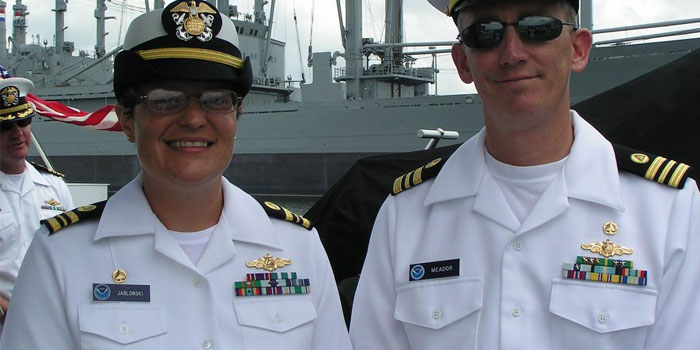
Meet Holly Joblonski
Meet Lieutenant Commander Holly Jablonski, a member of the NOAA Commissioned Officer Corps who served as the Commanding Officer on the NOAA Ship Nancy Foster. Read the full text of Holly's interview below to learn more about her job.
About the Job
What is your title?
Commanding Officer (CO), NOAA Ship Nancy Foster.
Where do you work?
I’m a member of the NOAA Commissioned Officer Corps (NOAA Corps). This is a uniformed service under the Department of Commerce. Officers change assignments every two to three years, typically rotating between shipboard and shore assignments. I began my tour aboard NOAA Ship Nancy Foster in May of 2012.
Do you travel often? To where?
NOAA Corps officers rotate between assignments ashore and afloat every two to three years. This can mean significant travel and relocation throughout a career. When shipboard, I’ve been up and down the eastern seaboard, as well as in the Caribbean, the Pacific Ocean, and the Bering Sea.
What are the educational requirements for your job?
NOAA Corps officers typically have a Bachelor’s degree in math, engineering, or sciences pertaining to NOAA’s missions. The specific requirements are: 1) A Bachelor’s degree from an institution with accreditation recognized by the U.S. Department of Education and 2) coursework must include at least 48 semester hours of math, engineering, or sciences pertaining to NOAA’s missions (including college-level calculus or physics).
What is the salary range for someone with your type of job?
NOAA Corps pay is very similar to the military services and includes both base pay and certain tax-free allowances that can vary based on station and duties. Entry-level pay can be estimated around $40,000/year.
How many hours do you work per week?
As a commissioned officer, I am technically on call 24/7. The number of hours I work each week varies depending on what needs to be done. I’d estimate anywhere from 70-90 hours in an average week.
Job Duties
Tell us about the types of things you do.
As Commanding Officer, I am ultimately responsible for the safety of the ship and all personnel embarked upon her, management of shipboard operations, and success of the ship’s mission. Much of my work is done through delegation to various departments, while I focus more on the big picture and long-term items. Having officers/crew as professional and competent as those on Nancy Foster makes my job much easier than it could be. I am a lucky CO!
What is the most fascinating thing you have ever seen or done?
It’s difficult to pick one specific thing. In general, I’m fascinated by how little we know about what lies beneath the sea’s surface. From unfound shipwrecks to unknown species, there is so much that has yet to be explored.
What are the personal rewards of your work?
Probably the biggest personal reward is my ability to continue learning new things, even after 13 years. NOAA has so many different missions, and NOAA Corps officers change assignments every two to three years. It keeps things exciting! As a Commanding Officer, it’s very rewarding when I can influence positive events or change for my people, the ship, our projects, and the organization.
How does your work benefit the public?
The work NOAA does benefits the public in various ways. Most of my career has been spent involved in hydrographic survey. This data is applied to nautical charts for safe vessel navigation, which is critical to support today’s global economy. My other NOAA experiences have introduced me to missions such as sustainable fisheries, severe weather response, tsunami prediction, and overall health of our oceans and atmosphere.
What else could someone with your background do?
An engineering degree is great preparation for any number of careers. In my opinion, the most important skill learned is logical thinking. This is important for analyzing and troubleshooting problems of all kind.
About Holly
What sparked your initial interest in ocean sciences?
I grew up near the Delaware Bay and spent a lot of time in my brother’s 16-foot runabout boat. But, it wasn’t until I went to college in the landlocked midwest that I realized how much I loved the water. I think more than an interest specifically in ocean sciences, I have a passion for applying engineering and technology in a maritime environment.
Who influenced you or encouraged you the most?
My father was a great influence on my life. He was a Korean War veteran, an electrical engineer, and at one point, a New Jersey State Marine Policeman. He taught me the values of education, pursuing a career with meaning, and maintaining personal integrity. With his background, he easily related to most challenges I’ve faced, and was always a rock when I needed support.
Looking back, was there anything you would have done differently in your education or career journey?
If I could do it all over again, I would pursue more hands-on technical experience during my college years. But, I think I’ve learned from all my life experiences. There are certainly different paths I could have taken, and they may have been equally rewarding, but I have no regrets about the path I’ve chosen.
What obstacles did you encounter along the way?
This is a demanding career, though I’m not sure I consider that an obstacle because the work is rewarding. The biggest challenge I face right now is maintaining a work/family balance. Fortunately, I have the most amazing and supportive spouse.
What are your hobbies?
I love to cook and find that it relaxes me no matter how stressful life gets. This has been my primary hobby in recent years. (I’m known among family and friends for cranking out a ton of Christmas candy and homemade jams/jellies every year for gifts.) I also like recreational kayaking and bicycling around my home in West Virginia, or roller blading/skating when on flat ground. When I have more time, I enjoy learning about and working on a couple old Jeeps and my dad’s power boat.